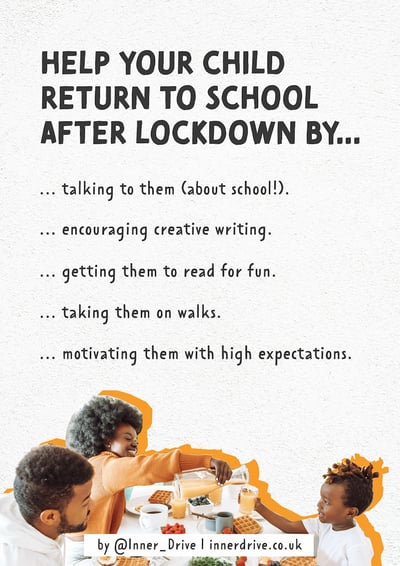As schools begin to reopen, many worry about how to help students after lockdown. The government has recently put millions of pounds worth of funding into education and summer schools to help students ‘catch up’.
Although many people in the teaching community have voiced concerns about extra school hours over the summer, there is still much discussion about what teachers can do.
Related:
- Growing back student resilience after months of lockdown
- Retrieval practice, the best way to help your students after lockdown?
- How to make you summer school catch-up programme a success
However, teachers aren’t the only adults in students’ life. How can parents and guardians best support their child after lockdown? No doubt, the past few months have been uncertain and stressful for them as well. Parents may also be unsure of how to tackle the months ahead, hoping for direction.
At InnerDrive, we believe that parents can play a fundamental role over the coming months, so we’ve put together some tips for what we think are the best things parents can do.
5 ways parents can help their children after lockdown
1. Regular communicationThis has been an unsettling year for all students and as schools open up today, many are going to feel apprehensive about going back. It’s important that you maintain regular communication with your child about their school life. This will allow you to address potential problems as they come up before they become something bigger and heighten your child’s already elevated stress and anxiety levels.
One strategy to improve communication and help your child feel better in uncertain situations is to ask them questions about their day, how they’re finding school, what their short-term and long-term goals are and, if they’re struggling, what can they do to fix it. By adopting a more positive, solution-focused thinking style in your conversations, your child will be better equipped to develop a growth mindset and handle the upcoming months better. When having these types of conversations with your child, remember to actively listen and let them do the talking, be approachable and don’t dismiss their concerns.
2. Get them writing
Students know the impact Covid-19 has had on their learning and, just like with reading, student’s writing proficiency and stamina have also taken a hit. Not only do good writing skills allow students to effectively communicate their ideas and opinions, but they also enable students to develop their critical thinking skills, improving their overall understanding of syllabus content.
Many students have been learning through a device most of the year, decreasing the need to practice writing by hand. However, a lack of effective writing skills now will only negatively impact students in the long run. One way for parents to help is to encourage their child to complete homework writing tasks by hand instead of typing them up.
Alternatively, you can create games that teach your child to write as they play or encourage them to journal so they can jot down their thoughts and feelings if they’re feeling overwhelmed. Since students are feeling particularly stressed at the moment, keeping a diary or journal is a great way to improve overall well-being.
3. Get them reading
Reading is an essential skill that contributes to the development of students’ communication skills, comprehension skills, and overall academic attainment. However, as a result of the Covid-19 pandemic, students are slipping behind in this skill. Research shows that reading for pleasure is essential for personal development and academic success to it is important that parents find ways to get their child into the habit of reading.
One way parents can encourage good reading habits is to let their child choose the book they want to read. 73% of children say they would read more if they could find a book they enjoyed rather than being forced to read a book they don’t want to read. Getting older and younger siblings to read to each other is another great way of boosting your child’s reading confidence, language fluency, and knowledge of vocabulary. However, you also need your child that reading is an important lifelong skill, and the best way to do that is to read regularly yourself.
4. Go on awe walks
The benefits of exercise on students’ performance are numerous:
- It boosts brain power
- It enhances sleep quality
- It helps reduce stress
- It improves overall mood
Therefore, it is important that parents make physical activity an integral part of their child’s daily routine, even if schools have resumed face-to-face teaching. As you now know, physical activity doesn’t need to be anything extraneous: a simple short walk increases confidence, happiness, and attentiveness levels.
However, one way parents can really help their child is to go on ‘awe walks’. These encourage viewing a walk as more than exercise or an excuse to go outside, but as a way to focus and appreciate the natural world around you. Research shows that people who paid attention to and appreciated their surroundings on a 15-minute ‘awe walk’ reported an improved mood.
‘Awe walks’ can be viewed as a mindfulness strategy, the ability to be fully present and connect with their emotions and sensations. Helping your child develop their mindfulness skills will not only help them identify helpful and unhelpful beliefs but will also allow them to gain a more positive perspective about going back to school.
5. Develop Intrinsic motivation
Prolonged isolation isn’t good for anyone. As a result, many students’ mental well-being has been pushed to breaking point. And with exams cancelled for many, their motivation has taken a hit as well. As a parent, it can be hard to motivate your child to work hard – especially when they no longer see the point. Therefore, it’s important that you target your child’s intrinsic motivation so they motivate themselves.
Encourage your child to set realistic but challenging goals that they can strive for before helping them make a plan to reach said goals. By getting them to think both short and long-term about why the actions they take now are important and can have a domino effect on future success, you motivate them into action.
Having high expectations is another great way to boost your child’s intrinsic motivation as it inspires them to push themselves rather than settling for where they’re at now.
FINAL THOUGHTS
These next few months are going to be full of change. Many students are going to struggle as a sense of normalcy begins to return, and will need help navigating this return. Parents’ role in this will be crucial.
If you regularly communicate with them, listen to them, motivate them and encourage them to develop important skills they may have lost, your child will be able to approach the uncertain times ahead with an optimistic outlook.
For tips on how else you can help your child, both personally and academically, check out our blog on how you can help your child thrive in school and how you can help them specifically in 2021.







